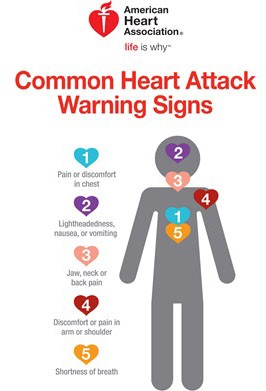Search
press Enter to search and ESC to close.
Signs & Symptoms of a Heart Attack in Women

Women and men have different symptoms of a heart attack. Many signs can be mistaken for something else, and are often ignored by the person experiencing them. Do you know what to look for in yourself or in a loved one?
What Exactly Is a Heart Attack?
A heart attack is a common but complicated event that is the result of multiple factors. Because our heart needs oxygen to survive, when the blood bringing this oxygen to your heart is reduced or cut-off, your heart cannot function.
One of the ways the blood supply to our hearts can be comprised is through a slow process called atherosclerosis. This occurs when fat, cholesterol and other substances like cellular waste products build up inside the coronary arteries. These substances that block blood flow is collectively known as plaque. This plaque can break apart and form blood clots. These clots are what actually block blood from reaching the heart.
When the heart is starved for oxygen due to reduced blood flow, this is called ischemia. The heart does not receive blood, thus no oxygen or nutrients delivered through the blood are received. Part of your heart can become damaged or even die due to ischemia. When this occurs, it is a heart attack (also called a myocardial infarction).
The process of atherosclerosis has no symptoms. While some hardening of the arteries is natural as we age, scientists don’t know for sure exactly what causes it to start. There are studies that show cigarette smoking and high blood pressure can be triggers, as well as high levels of triglycerides and cholesterol in the blood.
A person may experience angina, which is a chest pain resulting from reduced blood flow to the heart. This can feel like a heart attack or can be a symptom of a heart attack. Regardless, it is a warning sign that plaque build up in the coronary arteries is becoming a concern.
Women: Signs of a Heart Attack
Both men and women both experience the most common sign of a heart attack: pain or discomfort in the chest (angina).
However, it is important for women to know and recognize the signs of a heart attack as they present in the female species. In general, women take 2-4 hours longer than men to respond to the signs of a heart attack. This limits the time allowed to react medically to the episode. Women are more likely to experience sudden death as a result of a heart attack, and this could be because they do not recognize what they are experiencing is a heart attack.
Nearly a quarter of a million women will die each year from cardiovascular disease. For women, they may feel an uncomfortable squeezing pressure or pain in the center of their chest. This pain can go on for several minutes, or dissipate and then return. Other signs that are more commonly felt by women include pain in one or both arms as well as in their jaw, back, neck or even stomach. They may feel nauseous or break out in a cold sweat. Feelings of lightheadedness or shortness of breath are other common signs.
Don’t Ignore the Signs
Many women chalk up signs of a heart attack to other things. They convince themselves they are just tired, or maybe are “fighting off something”. They may often think they have the flu or acid reflux. Often women are guilty of assigning their pain to normal aging.
This is very common because women tend to put their families’ needs ahead of their own. They don’t want to worry or inconvenience anyone else. This is also part of the reason women wait 2-4 hours longer than men to seek medical help for a heart attack.
Take Care of Yourself
A heart attack can be very scary for the person experiencing it as well as their family members or friends. The good news is that despite 1.5 million heart attacks every year, many people are able to recover and go on to live long, healthy lives.
A regular visit to your doctor to determine your heart health and potential risk factors should be part of your healthcare plan. Easy lifestyle changes can also go a long way to keeping your heart healthy. Stop smoking and modify your diet to eliminate fatty foods that can cause cholesterol and obesity.
Pay attention to the warning signs listed in this article and don’t ignore them if they present in yourself or a loved one. It is better to be safe rather than sorry when it comes to anyone’s health.
Learn more about wellness and living a healthy life at The Villas Senior Care Community by visiting our website today!
